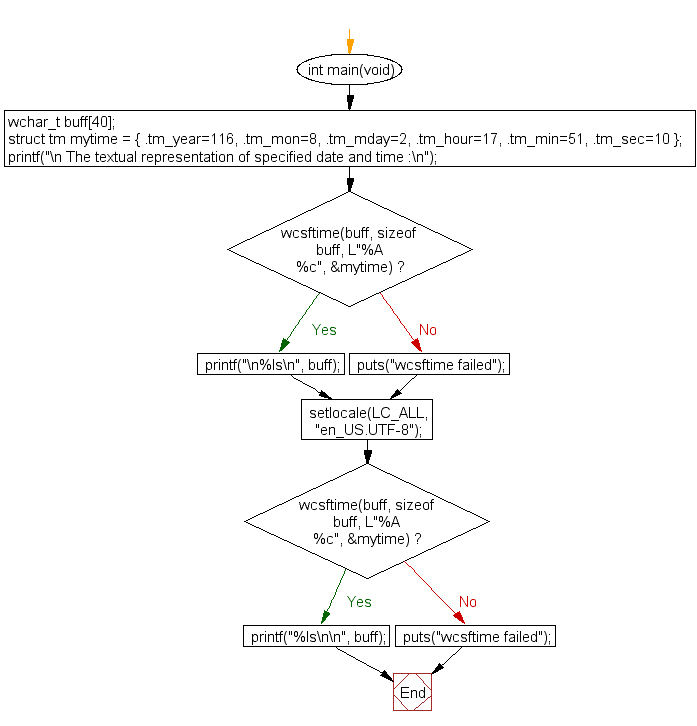C Exercises: Convert a tm object to custom wide string textual representation
C Date Time: Exercise-5 with Solution
Write a program in C to convert a tm object to custom wide string textual representation.
Sample Solution:
C Code:
#include <stdio.h>
#include <time.h>
#include <wchar.h>
#include <locale.h>
int main(void)
{
wchar_t buff[40];
struct tm mytime = { .tm_year=116, // = year 2016
.tm_mon=8, // = 9th month
.tm_mday=2, // = 2nd day
.tm_hour=17, // = 17 hours
.tm_min=51, // = 51 minutes
.tm_sec=10 // = 10 secs
};
printf("\n The textual representation of specified date and time :\n");
if (wcsftime(buff, sizeof buff, L"%A %c", &mytime)) {
printf("\n%ls\n", buff);
} else {
puts("wcsftime failed");
}
setlocale(LC_ALL, "en_US.UTF-8");
if (wcsftime(buff, sizeof buff, L"%A %c", &mytime)) {
printf("%ls\n\n", buff);
} else {
puts("wcsftime failed");
}
}
Sample Output:
The textual representation of specified date and time : Sunday 09/02/16 17:51:10 Sunday 09/02/16 17:51:10
Flowchart:

C Programming Code Editor:
Contribute your code and comments through Disqus.
Previous: Write a program in C to convert a tm object to custom textual representation.
Next: Write a program in C to convert a time_t object to calendar time expressed as Coordinated Universal Time.
What is the difficulty level of this exercise?
Test your Programming skills with w3resource's quiz.
C Programming: Tips of the Day
Static variable inside of a function in C
The scope of variable is where the variable name can be seen. Here, x is visible only inside function foo().
The lifetime of a variable is the period over which it exists. If x were defined without the keyword static, the lifetime would be from the entry into foo() to the return from foo(); so it would be re-initialized to 5 on every call.
The keyword static acts to extend the lifetime of a variable to the lifetime of the programme; e.g. initialization occurs once and once only and then the variable retains its value - whatever it has come to be - over all future calls to foo().
Ref : https://bit.ly/3fOq7XP
- New Content published on w3resource:
- HTML-CSS Practical: Exercises, Practice, Solution
- Java Regular Expression: Exercises, Practice, Solution
- Scala Programming Exercises, Practice, Solution
- Python Itertools exercises
- Python Numpy exercises
- Python GeoPy Package exercises
- Python Pandas exercises
- Python nltk exercises
- Python BeautifulSoup exercises
- Form Template
- Composer - PHP Package Manager
- PHPUnit - PHP Testing
- Laravel - PHP Framework
- Angular - JavaScript Framework
- Vue - JavaScript Framework
- Jest - JavaScript Testing Framework
